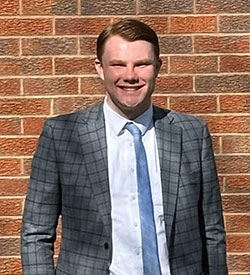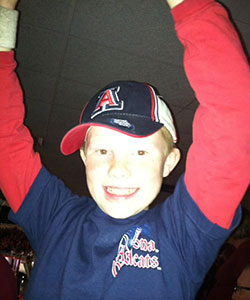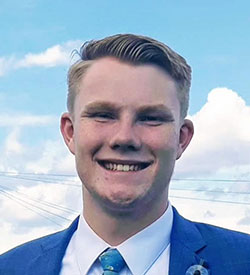From special education to social and academic excellence

The power of early intervention, family dedication and pivotal response treatment

Connor is an exceptional person in so many ways: outstanding student, leader, and an inspiration to others. Formerly a member of the DES Division of Developmental Disabilities (DDD), Connor's achievements exceed all expectations. These achievements were hard won by him and his entire family. In fact, he and his family are a tribute to the success and importance of early intervention, socialization and a specialized behavioral therapy.
The story begins in California, during Connor's early childhood. His mother attended a free training session for parents of children with autism, which was led by a graduate student at University of California, Santa Barbara. There, she was introduced to Pivotal Response Treatment (PRT). After the session, she immediately called her husband, Clay, and urged him to find out more. "That was kind of a pivotal moment," said Clay.
According to Autism Speaks, PRT is "play-based" behavioral treatment for autism that is initiated by the child. PRT is based on the principles of Applied Behavior Analysis (ABA), a therapy that binds fun with learning and appropriate behaviors. According to Clay, PRT essentially trains the family to give the therapy, so that the therapy is conducted 24/7.
Read: Applying Behavioral Therapy Techniques Helps Keep Teen at Home with Family

The family moved from California to Safford, Arizona in 2007 when Connor was 5 years old. Connor was enrolled in the local school and became a DDD member. That's when the family met DDD Support Coordination Supervisor William Leckliter, who would become an important part of Connor's life. "Bill Leckliter has been championing [Connor's] cause from day one," said Clay.
There were times when the school would want to pull Connor out of class for interventions. At one point, the special education director suggested that Connor "doesn't really care if he has friends or not, he's autistic." Connor's parents' response: "That's not true."
Tensions intensified when Connor was about 8 years old: The school suggested moving Connor to another school to put him in a program that had more resources to help him, but he wouldn't have had his peers that he associated with daily. Bill was able to help the family advocate to keep Connor at his home elementary school and in the classroom as much as possible, with the support of an aide assigned to Connor's class.
Throughout his primary and secondary school years, the family practiced PRT techniques to encourage Connor's communication skills and build upon the support provided by DDD. "His siblings became his therapists in essence," Clay explained. "And that was pivotal for him, because now we started to see more speech. He wasn't being allowed to not talk at home. If he wanted a cookie, he had to ask for it instead of just pointing."
Coincidentally, the man who led the PRT sessions in California also moved to Arizona to become head of the Southwest Autism Research & Resource Center (SARRC) in Phoenix. Through their contact with SARRC, Clay and his wife learned of a summer camp program offered at the Scottsdale YMCA that integrated children with and without autism. "I don't know if we would have even known about it because we're obviously rural," said Clay. With DDD's help, Connor and his family would spend two or three weeks each summer in the Valley of the Sun. It's your typical summer camp: games, crafts, swimming. Among the YMCA staff was a SARRC representative to provide interventions. After a day of ‘camping,' the parents and staff would regroup at the end of the day and have discussions on how the day went and make plans for the next.
Both of Connor's parents are educational professionals, a background that helped them tremendously with their son's education. Clay is an administrator with a technical college: "I've sat in a lot of [Individualized Education Plans, or IEPs] and I see a lot of parents who don't know what to do and don't know how to advocate for their kids. Sometimes, when you tell parents, ‘you can do this or that,' they're not ready to take that on because it's a lot of work."

Since those early years, Connor was exited from his IEP as a freshman in high school. He became a National Honor Society student, joined the school band and participated in the high school's news broadcast group. "Just super high achieving all around," said Clay. "He was a 4.0 kid."
Bill, who attended several team meetings with the family and their DDD Support Coordinator over the years remembers, "When Connor turned 18, I was asked to attend that [final] meeting because everyone knew Connor no longer met criteria for DD eligibility, so we made it a celebration meeting."
After high school, Connor served a two-year mission for his church and lived in England by himself. Today, Connor is attending Northern Arizona University (NAU) on a full scholarship and is majoring in journalism–specifically, broadcast journalism, a field that requires socialization. Putting theory to practice, Connor co-hosts a weekly sports radio show at NAU.
Clay credits his wife as "the driving force" behind Connor's achievements. Together, the couple are strong proponents for early intervention for all kids with disabilities. "That's huge. If you want to maximize benefits for anyone with a disability, the earlier you can start, the better."
The DES Division of Developmental Disabilities (DDD), as well as the DES Arizona Early Intervention Program, have several services for early childhood intervention. If you or a family member is interested in behavioral therapies, reach out to your support coordinator.

